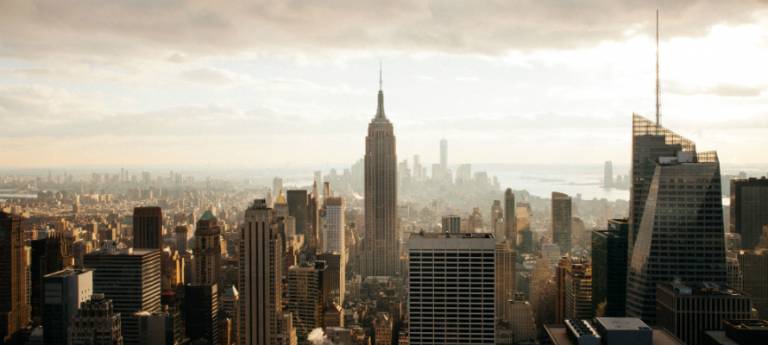Rockefeller University
14 March 2019
Nicolas Velez was one of 20 international students who spent 10 weeks in New York on the Rockefeller University Summer Undergraduate Research Fellowship program.

Nicolas Velez, Neuroscience
This summer I was one of 20 fortunate students from around the world that attended the Summer Undergraduate Research Fellowship program at The Rockefeller University in New York city. The program offered the opportunity to work for 10 weeks in a lab which fitted my scientific interests, with close mentoring from senior members in the lab, weekly research lectures, journal clubs and the possibility the cultural hub that is New York city. The program provided its attendants with free accommodation, transport, invitations to cultural events and a generous stipend for each student to take.
My lab project consisted in characterizing the interaction of ApoE, a lipoprotein, considered the largest risk-factor of non-heritable cases of Alzheimer’s disease. The role of this protein in the pathology is still elusive. I investigated the interaction of this protein with amyloid plaques, glial activation and fibrin deposition, all pathological landmarks, in an Alzheimer’s disease mouse model. Additionally, due to some preliminary results in human plasma and cerebrospinal fluid showing decreased levels of ApoE in Alzhiemer’s patients, I showed this decrease may also be present in this mouse model.
The lab attempted to answer these questions using an array of biochemistry techniques. Given that beyond the basics, these topics are not covered deeply within the UCL neuroscience degree, in expense of a more rigorous formation in neurophysiology, this experience was both challenging and highly enriching. Besides the techniques, I experienced several qualities of scientific research that are not apparent before having a laboratory experience. Even though my mentor provided me with correct guidance and support, he also encouraged me to think critically and independently, generate sensible conclusions from my results and formulate new hypotheses. Moreover, I was exposed with the constant failures present in research and, thus, and was constantly forced to persevere and learn from my mistakes. Finally, I was also exposed to the rigorous scientific thinking. I had to provide replicates, think of proper controls for each experiment, and avoid proposing any unwarranted inferences from my results before alternative explanations are refuted.
Besides my project, I was involved in lab meetings to revise grant applications, discuss the results of peers and receive presentations from other aspects within the field of Alzheimer’s disease and neurodegeneration. In these meetings, I also talked to several senior members in the lab who, very nicely, gave me advice for my career both on a professional and personal level. At the end of the 10 weeks I had to present a poster to fellow undergrad students in the program and all university members. Moreover, I had to give a lab presentation, in which I was scrutinized to detail about my project. Both experiences helped me develop my communication skills within different scenarios, as I was required to convey the ideas of my project in the clearest way possible to audiences with variable amounts of knowledge for the topic.
Besides the lab, scheduled lectures by faculty members exposed me to many interesting topics in biomedical sciences. Lecturers talked about their research, both past and present, and about their life experience within academia, giving valuable advice to us, as aspiring scientists. Such lectures also allowed me to network with several researchers in Rockefeller.
Journal clubs and social gathering allowed me to socialize with grad students at the university and other students attending the program. It was very exciting to be surrounded by keen scientific minds. This meant I learned something new from every single interaction. Most students attending the program were avid debaters, and were constantly discussing about each other’s work or any “hot” topic prevalent during summer. And since like-minded individuals usually become friends, I ended up with friends from all over the world.
Besides science, we usually explored the interminable possibilities for leisure offered by New York city. These included art museums, musicals, conferences, concerts for any music taste, theater a very vibrant nightlife and even. a pizza tour. New Yorkers tend to love their city, and they have a very strong argument on why that is so. Therefore, I was always busy and entertained, even at times when I was not working. The only caveat being that between the intense work and learning hours, and the constant distractions, it was sometimes challenging to maintain a balanced lifestyle and have some down-time to relax. However, in retrospect, this serves as practical knowledge for any future professional experience.
I highly recommend this experience to any students wishing to pursue a career in scientific research. It exposes students to the pressure, obstacles and rewards of life in academia, helps them develop their scientific and translational skills, and is a perfect opportunity to travel and live in a new and very exciting city.
 Close
Close

